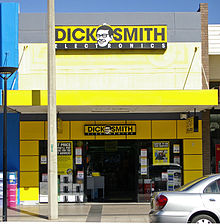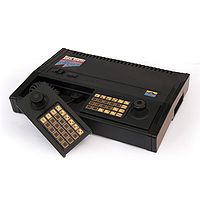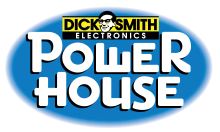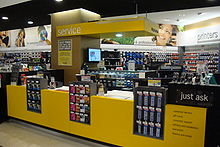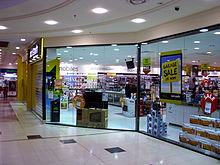- Dick Smith (retailer)
-
Dick Smith 
Type Subsidiary Industry Retail Founded 1968 Headquarters Chullora, New South Wales, Australia Key people Debra Singh, General Manager
Dick Smith (until 1982)Products Electronic kits, electronic components, alarm systems, landline and mobile telephones, electronic test equipment, tools, speakers, car audio, personal computers, books, antennas Employees 2000+ Parent Woolworths Limited Website www.dicksmith.com.au
www.dicksmith.co.nzDick Smith (formerly Dick Smith Electronics) is an international electronics retailer, founded in 1968 by Richard "Dick" Smith. Today, it is a subsidiary of Woolworths Limited, incorporating Tandy, and the remaining Dick Smith Powerhouse Stores. Founder Dick Smith no longer owns any part of the company.
The business started as a small car radio installation business in the Sydney suburb of Artarmon, New South Wales, and has expanded to employ over 2,000 people. It is co-major sponsor of AFL club the Richmond Tigers since 2008.
Contents
History
Early days
The business started in 1968 in a small rented space below a car park in the Sydney suburb of Artarmon, New South Wales, with a total capital of only $610. In 1969 the business's success required it to move to bigger premises. After touring overseas electronic stores to study modern merchandising methods, Smith introduced self-serve shopping and produced a mail-order annual catalogue with a substantial data section. To ensure almost every electronic enthusiast in Australia had one of his catalogues, it was included free in the popular electronics magazines such as Electronics Australia and Electronics Today International. This catalogue continues to be produced.
Stunts
The company was promoted through the annual catalogue, wacky ads (e.g. the "Electronic Dick") and publicity stunts. For example Smith claimed that he would tow an iceberg from Antarctica to Sydney Harbour, cut it up into small bits and sell it. However he instead towed a man-made iceberg, constructed on a barge, with a big sheet of white plastic and fire-fighting foam as an April fool's joke.[1] The profile of Dick Smith Electronics grew.[2]
Expansion
The company profited immensely from the CB radio boom of the 1970s and by the end of the decade had stores in all mainland states. Though many CB radio stores closed when interest waned from the early 1980s, Dick Smith Electronics survived thanks to strong sales in other areas. These included its established electronic components and kit lines (thousands of people started with the 'Fun Way' series and worked their way up to assembling Playmaster amplifiers and speakers), Yaesu amateur radio (the company had secured the exclusive dealership)[citation needed] and Uniden-Bearcat scanners.
Also important was the fast-growing personal computer market. The company sold well-known models such as the Commodore VIC-20 and Commodore 64. It also sold own-brand models, such as the System 80 which was compatible with the Tandy TRS-80 Model I, the Dick Smith Cat (an Apple II clone), the VZ-200 and VZ-300. In 1981, the Super-80 kit computer was developed as a joint venture between the company and Electronics Australia magazine.[3]
The company was particularly innovative in its product range, especially during the 1970s and 1980s. Some such forays paid off, while others were soon abandoned. Examples of briefly stocked items in the 1980s included Heathkit electronic kits, satellite TV receiving stations and, foreshadowing near-universal mobile phone ownership, Beeple pagers. More successful was the Dick Smith Wizzard, which earned a cult following amongst computer gamers.[citation needed]
Before telephone equipment was de-regulated in 1984,[citation needed] Australian consumers could only have two different types of telephones in three different colours. DSE was a major source of "non-type approved" telephone equipment. A broad range of answering machines, cordless and novelty phones were offered; despite the fine print warning that they were not 'type approved', thousands were sold anyway.[citation needed] Soon after, the market was de-regulated so that anyone could buy an approved phone and plug it in.
The Woolworths takeover and range changes
In 1980, the company had grown to 20 stores and the company's working capital was so much that he sold 60% of the company's working share to Woolworths Limited. Smith sold the balance to Woolworths in 1982 and it took full ownership of the company.[4] The company continued to add to its network of small "main street" stores in suburbs and regional cities across Australia. Today there are about 200 company-owned Dick Smith Electronics stores, with authorised stockists in country areas.
Though the company has almost always stocked items that would appeal to the general non-technical/non-hobbyist consumer, as the years went on these items took up an increasing proportion of floor space. Die-hard enthusiasts often bemoaned that Dick Smith Electronics was becoming like Tandy, a competitor in the consumer electronics business which generally stocked non-technical/non-hobbyist ranges with a small range of over-priced components in bubble-packs.
After rapid growth in the 1970s and 1980s, Tandy stagnated and suffered management problems at its USA headquarters. Woolworths purchased Tandy in 2001-2002, so that both Tandy and Dick Smith became part of the same group. With the takeover, some Tandy stores were closed while others became Dick Smith Electronics stores. Both stores have overlaps in their product range with DSE (Dick Smith Electronics) products being available in Tandy outlets.
Powerhouse
The late 1990s saw the company establish "Dick Smith Electronics Powerhouse" super-stores across the east-coast of Australia. The first PowerHouse store was opened in Bankstown, New South Wales, in 1996. These were several times bigger than regular stores and contained departments for the main product categories and supermarket-style checkouts. The "Powerhouses", as they were known, carried a wider range of products than the smaller DSE stores, especially in the computing, audio-visual and amateur radio areas, and introduced Music to the range. Some installation services were also introduced as well as Computer repairs and upgrading. Whilst the concept was well received in the first few years, there were some within Woolworths who felt that they should be smaller versions of their Big W stores, with less emphasis on Customer Service.
In 2002-2003 the Powerhouse concept changed to focus on a broader consumer market and less towards electronics enthusiasts. Component ranges shrank and general electronics books ceased to be stocked. The Yaesu dealership was relinquished, ending a 27-year partnership. Electronic Kits were transferred to the smaller DSE stores and were replaced by small appliances such as kettles, coffeemakers, toasters and frypans which were removed in late 2008. In late 2007, Powerhouse stores also transferred many other small components, tools, leads and connectors continuing to distance the super-stores from the company's roots.
In 2007, Dick Smith Powerhouse stores introduced a home installation service known as 'PowerSquad' to install major items such as TVs and Computer systems or to provide set-up and training on smaller items such as wireless networks and MP3 players.[5] The Powerhouse name was retired in 2009 as part of the company's rebranding. These stores are now known internally as Dick Smith 'Large Format'. The home installation service was relaunched in 2009 as 'Mobile Techxpert Services' inline with the company's new branding.
2008 rebranding
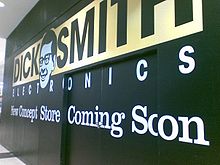 Hornsby DSE, housed inside Westfield Hornsby, was the first store to be renovated under the new concept
Hornsby DSE, housed inside Westfield Hornsby, was the first store to be renovated under the new concept
In early 2008, following Woolworths' review of its consumer electronics division, Dick Smith Electronics renovated its highly profitable[citation needed] Hornsby DSE store as a 'concept' under the branding "Dick Smith Technology". The store's design and product range was completely reworked incorporating a more modern feel while removing all electrical componentry and much of its tools. These products were replaced with a larger range of computers, gaming, televisions and Macintosh computers, much of which had previously been only sold in Powerhouse stores. After a dramatic increase in sales for the store, the Hornsby concept store ended the Christmas period of sales as the highest-selling Dick Smith Electronics store in the country.[citation needed]
Inside the first Dick Smith concept store Hornsby DSE following its rebranding as Dick Smith Technology
Following further strategic review, the company decided to push forward with the new concept under the reworked "Dick Smith - Talk to the Techxperts" branding, merging all existing Dick Smith Electronics and Powerhouse stores under the same banner. In late 2008 the new Dick Smith logo (designed by Hoyne Design) and format was rolled out with many Powerhouse stores such as Macquarie Centre and Auburn being rebranded to fit the new unified company logo. Powerhouse stores also cleared the majority of their small appliance lines in favour of electronic gadgets, toys and health devices with a new line of exercise equipment introduced to selected stores in early 2009. While some stores still remain semi-branded or full branded as Powerhouse, the advertising of this brand has discontinued and these stores are pending store refits to update the branding.
Powerhouse style stores, now "Large Format Stores" have recently opened in Chadstone Shopping Centre and Bendigo in Victoria, Innaloo, Perth central business district, Marion, South Australia and Rockingham in Western Australia, Hobart in Tasmania, and Stockland Rockhampton in Queensland, under new "Dick Smith - Talk to the Techxperts" branding. The new format stores have a refreshed look and logo, carry a similar range as all other Powerhouse stores minus the electrical components, plugs and sockets, with more of a focus on technology such as computers, entertainment and communications. This format will eventually replace the whole Dick Smith brand. In March 2009, Woolworths Limited CEO Michael Luscombe confirmed the end of Powerhouse as a separate entity, also adding the companies third consumer electronics brand Tandy would be gradually phased out over the next three years as the stores leases end. This phase will leave Dick Smith as the sole brand in the companies consumer electronics division.[6]
The Dick Smith brand
Dick Smith Electronics has also long been known for its 'home brand' range of electronics which fall under the brand name "Dick Smith" (Formally called DSE, a commonly used abbreviation of Dick Smith Electronics). Although initially, in the 1980s, the focus of the DSE brand was on phones, telephony equipment and some components, the brand has since expanded into a large range of various electronic devices and components with less focus on telephony. In 2007 the DSE brand produced a wide range of products including portable DVD players, TV set top boxes, aerials, AV receivers and amplifiers, NiCad and NiMH Rechargeable batteries as well as alkaline and lithium batteries, digital cameras, speakers, a large range of flash memory devices, UHF radios, webcams and a large range of Ethernet, Crossover, USB, Composite AV, Component AV, 240V AC cables.[7]
A number of the DSE brand products are re-branded products from third party manufacturers and are often sold alongside their original manufacturers version of the product. An example of this is DSE's SD card range which are manufactured by A-DATA and sold alongside A-DATA's own SD cards in many stores.
Outside of Australia
New Zealand
In New Zealand, Dick Smith Electronics has over 75 locations[8] including the "PowerHouse" stores, the first being in Hamilton, then Manukau, followed by Sylvia Park in Auckland, and Palmerston North. A third brand "Dick Smith Technology" store has also been opened in Lower Hutt, following the same PowerHouse product range. Its e-commerce website uses a search engine by SLI Systems that learns from what the users search for.[9] The 'Talk to the Techxperts' now 'Dick Does' rebranding has commenced in New Zealand including the Westfield Riccarton new concept store, which opened on May 28, 2009.
India
In 2006 Woolworths (parent company of Dick Smith) and the Tata Group of India announced an electronics retailing venture on the subcontinent. Due to the legal framework, foreign companies are prevented from operating retail businesses in India. Due to this, Woolworths will act as a wholesaler to the Tata Group. Woolworths manages the buying, marketing and IT support for the joint venture. The stores are based on the Dick Smith format but trade under the Croma brand. As is the case with head of Dick Smith New Zealand, Woolworths' head of Croma operations reports to General Manager - Australia, New Zealand and India.
United States
In 1985, the first branch was opened in the United States at 390 Convention Way, Redwood City, California.[citation needed] The location served as the main office, mail order centre, kit assembly area and retail store. Additional stores were opened in Shattuck Avenue, Berkeley, California; Stevens Creek Boulevard, San Jose, California; and in Los Angeles.[citation needed] Within a few years the US operation was sold.
See also
References
- ^ http://www.abc.net.au/queensland/conversations/stories/s1614826.htm%7Cpublisher=Australian Broadcasting Corporation|date=12-04-2006|title=Businessman and adventurer Dick Smith|accessdate2009-03-30
- ^ "Just tip of the iceberg". Sydney Morning Herald. 2004-03-23. http://www.smh.com.au/articles/2003/03/28/1048653853668.html. Retrieved 2007-12-09.
- ^ Super-80 Computer. (August 1981). Electronics Australia, p. 70.
- ^ "DSE About Us Page". DSE Ltd. http://www.dse.com.au/cgi-bin/dse.filereader?+EN/catalogs/INS0001611. Retrieved 2007-12-19.
- ^ "PowerSquad Website". http://www.dse.com.au/pages/powersquad/home/home.htm. Retrieved 2009-01-15.[dead link]
- ^ "Woolies sets deadline for Powerhouse and Tandy brands". Connected Australia. 2009-03-09. http://www.connectedaustralia.com/News/BreakingNews/tabid/119/selectmoduleid/579/ArticleID/1381/reftab/91/Default.aspx. Retrieved 2009-04-07.
- ^ "DSE Brand Range Search". DSE Ltd. http://dseau.resultspage.com/search.php?p=Q&srid=S2%2d1&lbc=dseau&ts=p2&w=dse&method=and&isort=score&srt=0. Retrieved 2007-12-19.
- ^ "Store Locations". DSE (NZ) Ltd. http://www.dse.co.nz/dse.shop/en/catalog/INF0002615. Retrieved 2009-02-03.
- ^ "News - E-commerce Search". S.L.I. Systems. http://www.sli-systems.com/news-oct2003-dse.shtml.
External links
Woolworths Limited Supermarkets Woolworths / Safeway(VIC) · Countdown(NZ) · Woolworths New Zealand(NZ) · Foodtown(NZ) · Food For Less · Flemings · Thomas Dux Grocer · Freshchoice(NZ) · SuperValue(NZ)Liquor Hospitality Australian Leisure and Hospitality GroupPetrol General merchandise Consumer electronics Home improvement Danks (Home Timber and Hardware · Plants Plus · Thrifty-Link Hardware) (66.6%) · Masters Home ImprovementRelated Everyday Services (Everyday Rewards · Everyday Money · Everyday Mobile) · Progressive Enterprises · 2006 Lockout · Big W VisionCategories:- Consumer electronics retailers of Australia
- Electronic component distributors
- Companies based in Sydney
- Companies established in 1968
- Woolworths Limited
Wikimedia Foundation. 2010.

